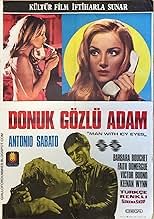An Arizona State Senator named Neil Robertson is murdered in front of his house, and the local police arrest a male suspect who has icy eyes. Then an Italian journalist, who is obliged to use somehow Americanised name, Eddie Mills, finds a strip-teaser named Anne, who seems to be a witness of the murder. And, partly because Anne testifies against the accused, the man with icy eyes is found guilty. But soon Eddie realised something wrong with the whole case... First of all, I want to say this film is not particularly bad. Indeed, this one is much better than the director's 1972 Giallo titled SCENES FROM A MURDER. However, this film doesn't seem to be a masterpiece mainly because its latter half is almost exclusively concerned with HOW TO STOP THE WRONG EXECUTION. Consequently, in proportion as the story develops, apparently most important question, namely, WHO IS THE ACTUAL KILLER?, becomes less and less important. Indeed, this film as a whole doesn't seem to be serious about the question. Furthermore, the last sequence of this film is much less suspenseful than that of Robert Wise's 1958 film, I WANT TO LIVE!, though these are concerned essentially with the same. And I think this being-less-suspenseful in the most important sequence is due to the director's almost characteristically paced direction rather than to the story-and-screenplay themselves. And, instead of the cinematic tension I WANT TO LIVE! has, this film has the rather (unnaturally) theatrical, like the scene in which Eddie and his partner, Hammond, are attacked by some robber just 20 minutes before the execution. Here, it seems to be natural to add this film more or less resembles Clint Eastwood's 1999 film, TRUE CRIME. However, this 1971 Giallo is much better than the 1999 junk. Indeed, as mentioned above, I don't think this film per se is not particularly bad one mainly because it has a unique element, namely, astrology. The film has a astrologer named Isaac Thetham, and he prophesies there will be two unidentified dead persons by midnight. (The execution is planed to be done at the very midnight.) The leading character, Eddie Mills, doesn't believe such a story, but soon he realises the astrologer's words become to be truthful. And this film almost surprisingly succeeds in using astrology effectively. Incidentally, for good or bad, Barbara Bouchet is rather manor in this film, even though she is the second person in the cast section of the credits of the very film. Her character, Anne, sometimes seems to be important, but ultimately she is nothing but decorative. So it can be said this is not a right film at least for the serious Bouchet fans.



























